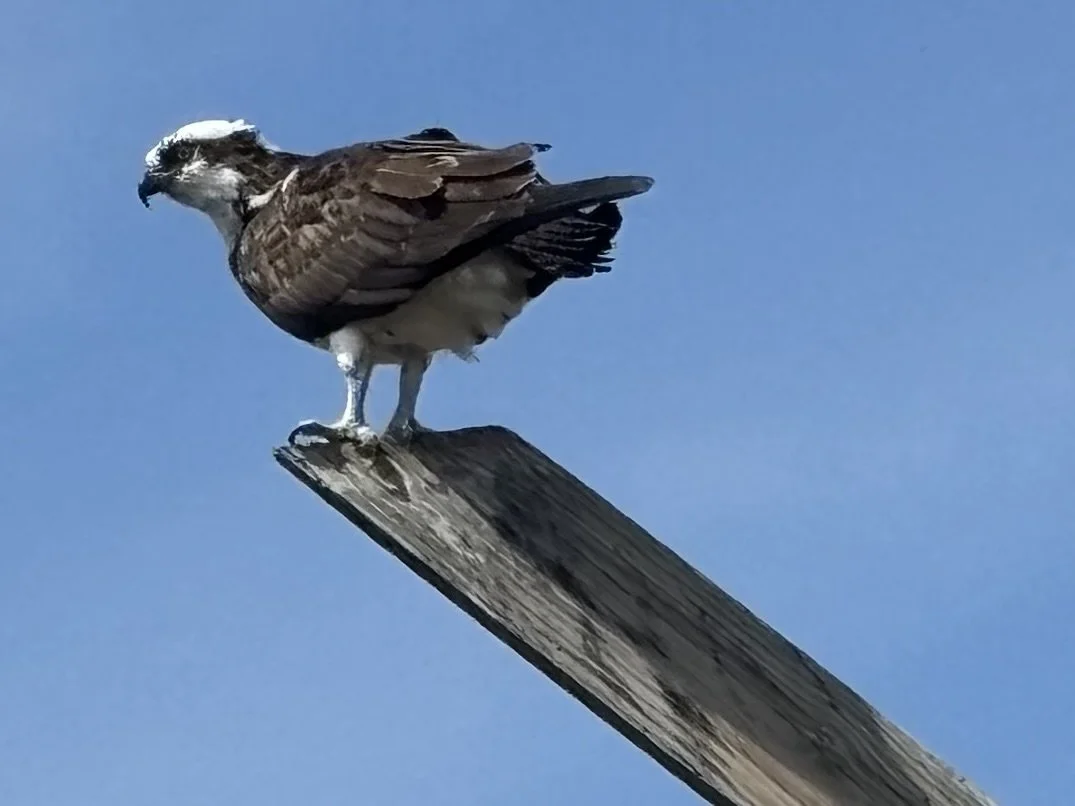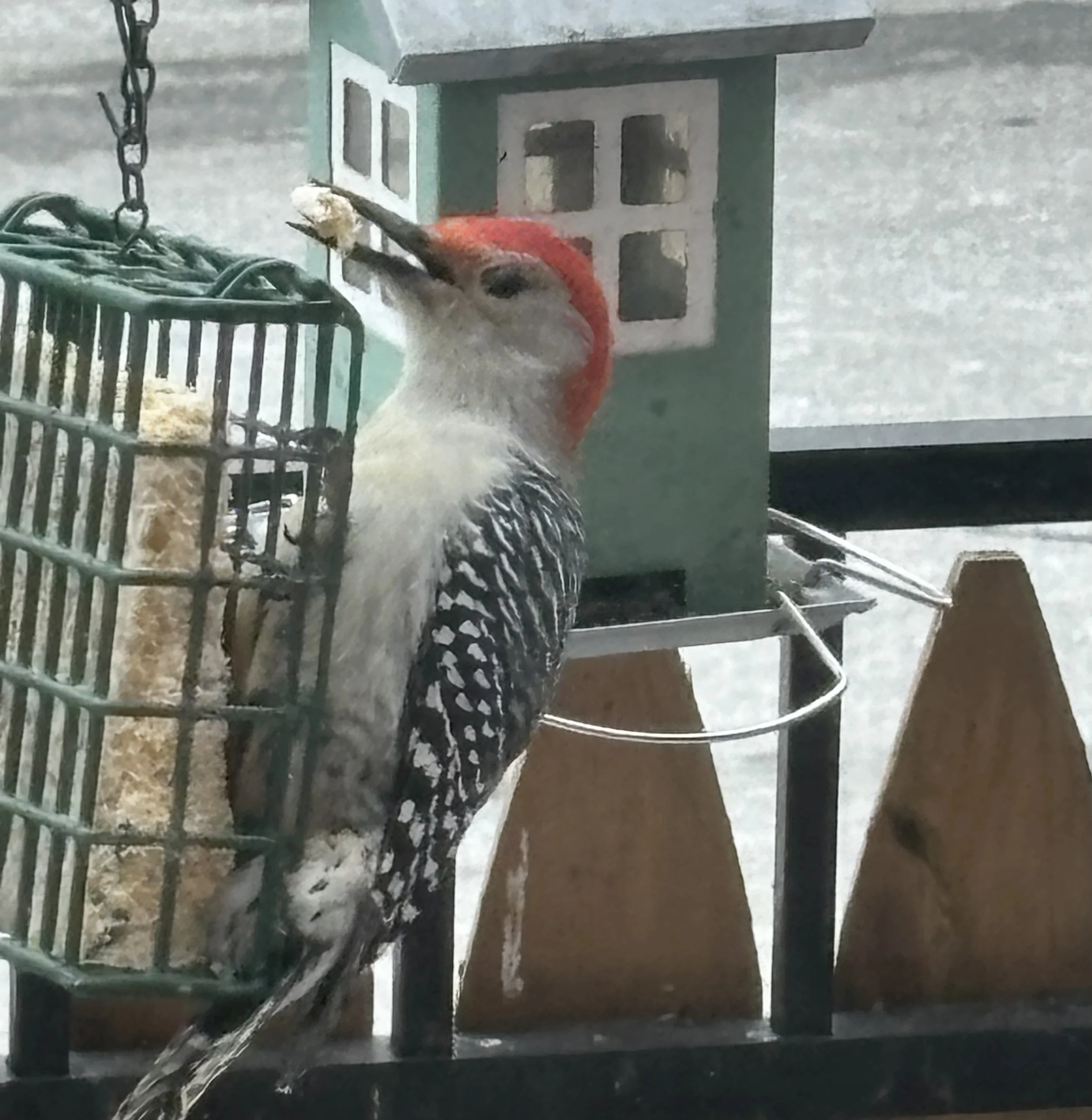Psychiatry Degree with a minor in Ornithology? Hmmm...
Sounds strange, but I really think it may be the perfect combo for those who suffer from anxiety and depression. I mean, have you ever felt sad when, while on vacation at the shore, you looked up at just the right time to see an Osprey dive into the ocean and with effort crank himself out of the waves with his catch in tow? Or have you ever felt worse when you walked outside in the morning and noticed the Robin's song coming from a secret, hidden spot?
Birds have their own little ministry.
In the 1970s Stephen and Rachel Kaplan began to connect some dots: Nature is a source of help. This wonderful couple from the University of Michigan has given us timeless research on the gifts of the natural world. They tied it all together in what they call Attention Restoration Theory.
Attention restoration?
Whew. Sounds like something we need.
The Kaplans found that too much focused-attention results in "mental fatigue." In other words, being zoned in mentally on something, these days, a screen, will exhaust our brains. The solution is, in part, taking ourselves OUTSIDE. I became intrigued with this research, though I didn’t actually need research to tell me something so totally obvious.
When I was a kid, I wandered with no destination. Inside was not where I wanted to be. I took to the fields, through the tall pine forest, along the overgrown, thorny trail around the lake, crept about the murky pond across the street, and explored the musty, dusty old barn that was part of the package included with the purchase of our house on Timberlake Drive. My imagination lit on fire. I was hooked into the glory of the natural land. Body. Mind. and Soul.
Wild spaces. Unplowed places. Full of creatures, foliage, and mystery. It may be too bold to say, but aside from my family, the land formed me the most.
As I have gotten older, nothing has changed; I still wander. When I am outside and alert to the splendor of Creation, tension is released, and stress floats away in the swirl of the Pennsylvania breeze.
I am a coach, a counselor, who invites my clients to look outside the churn of their internal chaos, to see something new instead of remaining too long in the darkness of the past or the uncertainty of the future. Don’t get me wrong, we need the courage to look back in order to forge forward. Naming those “lifequakes,” as author Bruce Feiler calls them, is the first step to movement.
The Kaplans have influenced my understanding of healing. Deliverance from the dark demons of anxiety, depression, and obsessive technology use is best found outdoors. They have motivated me to explore the colorful, wonder-FULL, magical secrets of the wild world. Our languishing, robot-like lives need the interruption of an American Goldfinch…our heaviness needs a lift with acrobatic Swifts overhead. The call of the Red-Shouldered hawk should wake us up from our screen trance and lead us into delight.
The Osprey
One of my favorite birds.
I took this photo in April, the closest I have ever been to one!
One of the most beautiful, short exhortations of Jesus was, you may remember, “Look to the sparrows…” And so, I do.
This is my secret: We need the birds, my friends. Our lives become frenzied when we go from thing to thing, back to back, and never pause to notice the emerald wings of the Tree Swallow sitting on the branch of the Maple outside the window.
In the mornings, I clip my dog on her leash for a quick walk around the block. She has some time to take care of her business and I have a few minutes to see what my winged friends are up to. They pop around flitting this way and that in search of seed on thistle, or buried in the grass under the cherry tree. The stress in my body slows down and trails off a few feet behind me while a Downy Woodpecker zips by and plucks up my attention. The Kaplan’s point: We can’t experience delight and stress at the same time. So we invite delight to do the work.
Mornings can feel daunting for those who struggle with anxiety or depression. The first few hours of the day can feel overwhelming if you are grieving or in the panic of unemployment. There are no easy solutions when it comes to dark seasons. As a matter of fact, author Barbara Brown Taylor wrote a whole book about this titled, Learning to Walk in the Dark. Her encouragement: look for the micro-moments of light…She writes:
“I have learned things in the dark that I could never have learned in the light, things that have saved my life over and over again, so that there is really only one logical conclusion. I need darkness as much as I need light.”
We can’t avoid dark seasons, we simply must learn to pilot them well. We must be alert to the light that shows up in our darkness, and God’s companionship with us in the dead center of the hard days. Not easy.
Let me tell you why I think birds are an elixir. They are ubiquitous. Always and everywhere, they are available to our hearts. Steady your gaze for the bold orange body of a Baltimore Oriel through the canopy of a broad Black Oak tree, look about and you’ll see the Red-Bellied Woodpecker inching his way up and down a dried-out dead tree trunk, put away your phone and you will hear the mew of the catbird from somewhere out there, and look carefully at the Rose of Sharon and you see the flutter of finches as they dart from branch to branch. There is no place where birds are not. Their songs spill out from the trees, their bodies spring up and down in the grassy fields, they make regular visits to the cone flowers, and their flight and dance are always on display above us.
The Red-Bellied Woodpecker
I LOVE when the Red-Bellied Woodpecker surprises me!
Feeder stations and water bowls are like welcome signs for local birds and maybe, if we’re lucky, a few rare birds migrating through.
It seems to me God had a good idea with the birds. No one is required to be an expert to enjoy them. No one has to pack their bags, drive for hours into the wilderness, and own all the REI gear to spot them. No one has to spend money, board a plane, or risk their lives.
We simply have to become comfortable with a pause. We just need to learn to look.
These days, both of these skills are more uncomfortable than we realize. Small screens have detached us. Technology has cranked our heads down, not up. Our eyes are locked into a space that isn’t real. Unable to see and hear, not only do we miss each other, we have no idea the Red-Bellied woodpecker’s song echoes just beyond the tree line calling us to calm.
So yes, birds are a mental health support system. They can actually change our mood, lift us out of our stress, and stir up dormant delight…they are nuggets of light in the darkness. We will be better for each other if we learn to love the birds (another blog to write!). I'm quite sure you will thank me.
Here's my bird challenge:
1. If you are a parent, pay attention to birds. Our kids learn to notice what we notice. They value what we value. Furthermore, they need examples of people who pause, who pay attention to beauty and are able to separate from a screen and get into Creation.
2. If you are a human, pay attention to birds. Start noticing their presence and then take an interest in their songs. It is telling that we have millions of these little (and big!) creatures flying and flitting through the air all around us and we hardly even notice them. A shift will happen—once you notice them, you will NOTICE them! Their simplicity will delight you and their unique manners will catch your attention and rewire your brain. It’s a fact.
3. Use the Merlin App, IF you are going to use your phone! This app is put out by Cornell University’s Ornithology Lab. It will pick up the songs of birds around and identify them for you. Slowly but surely, you will begin to know the calls and songs of the birds in your yard. You will notice them and wonder, “What is that?? Who is making that noise!?” Curiosity will keep you awake; it is a gift to your body, mind, and soul. Be contagious, others need to watch someone love something in order to love it themselves.
Look outside now...who did you spot?
Originally posted on July 19, 2023


